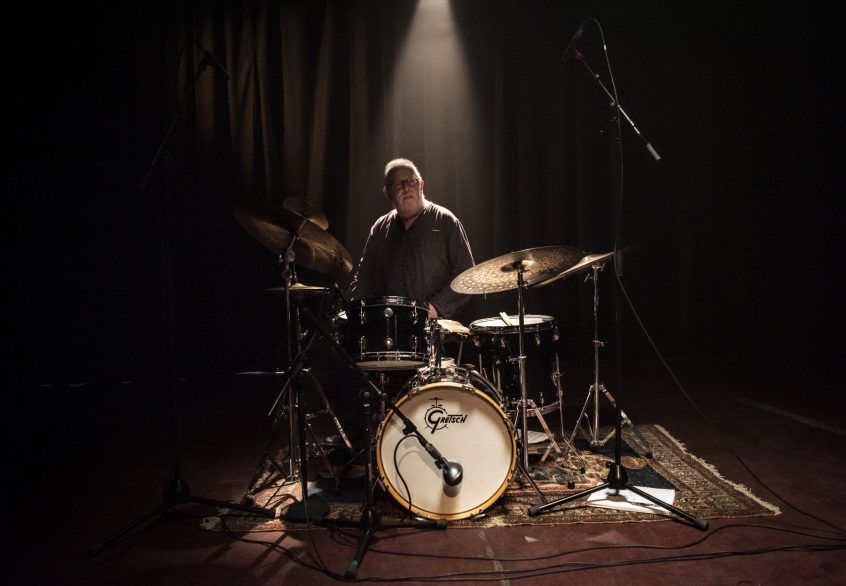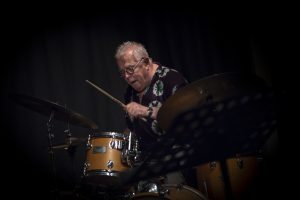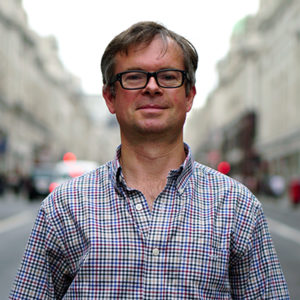Spike Wells Interview

Spike Wells is known for his enthusiasm, particularly behind the drum kit. On the day we spoke, the day after Ron Mathewson’s funeral, his sense of frustration was evident.
Last summer he was able to officiate the funeral of long-time friend Peter King, which featured fitting tributes from Julian Joseph and Henry Lowther. In this, our third lockdown, with the funeral of his old friend Ron Mathewson, Spike was only able to watch online. This, together with the lack of live music has added to Spike’s frustration, saying “I’m just sitting at home trying to keep my chops together.”
Spike’s interest in music dates back to his time as a young chorister at Canterbury Cathedral Choir School but he soon developed an interest in jazz. “I was playing the drums at school, in my teens, having been turned on by listening to Louis Armstrong and then bebop. Somebody played me a Dizzy Gillespie EP so I got into modern jazz that way.”
Spike’s love of jazz continued throughout the 1960s whilst at university in Oxford. “I was just mad about jazz and that was all I wanted to think about. We had quite a good scene at university and with a local band we invited guest soloists up from London to play with us, which was a really good education. I remember being blown away by playing with people like Joe Harriot, and Bobby Wellins came up to play with us. That was the start of a lifelong association between us. I played with him on and off for the rest of his life.”
After university Spike “half-heartedly” started a postgraduate degree in London and lived at the famous 80 Sinclair Road house in West Kensington. The house was full of musicians, with pianist Mick Pyne, his trombonist brother Chris Pyne, alto sax player Ray Warleigh and bassist Ron Mathewson. “Ron was playing with Tubby Hayes, and Tubby needed a new drummer so Ron got me into the Tubby Hayes Quartet, which was like starting at the deep end as a professional musician. That was it really. I gave up everything for a while except that music.”
Together with guitarist Louis Stewart, Spike and Ron Mathewson formed a formidable rhythm section, which pianist Gordon Beck described as “the single greatest rhythm section in all of British jazz”. This made Spike very much in demand and as well as playing with Tubby he later joined Ronnie Scott’s Sextet and performed with a number of high profile American musicians at Ronnie Scott’s club, including Stan Getz and Roland Kirk. Spike also did a year touring with Humphrey Lyttelton’s band which he describes as “a great experience”.
After Tubby’s death in 1973 Spike decided to pursue a career outside of music. Whilst Melody Maker ran a piece entitled ‘The Musical Obituary of Spike Wells’ it certainly wasn’t the end of Spike’s drumming career: “I trained to become a lawyer and I went on playing semi-professionally as I have done for the rest of my life. I was very lucky. Even though I was doing a day gig I still managed to work professionally with Bobby Wellins, and also in the 1980s I played for several years in Peter King’s quintet.”
As well as recording on numerous albums by Bobby Wellins, Spike also appears on Peter King’s debut album as leader, New Beginnings, recorded in 1982 with pianist John Horler. Spike also features on Horler’s albums Gentle Piece and Not a Cloud in the Sky.
Spike’s playing career continued into the 1990s and 2000s performing with musicians such as Alan Barnes. “In the late 90s Simon Spillett came along and I joined his quartet. Normally I have a regular monthly gig at the Bull’s Head in Barnes with Art Themen, and gigs with Simon Spillett’s quartet, whenever that can start up again.”
For the past 30 years Spike has also led his own piano trio. “I’ve had a lot of fun with that. It started in the days of Brighton Jazz Club at the Pig in Paradise [now the Hope and Ruin]. Liam Noble used to do it, then I managed to get Gwilym Simcock for a year or so, but then he quickly moved on to his international career. Another wonderful pianist that I love playing with is Barry Green, who lives in London; he’s played with me in Brighton a few times, and Mark Edwards of course – I’ve used him a lot, and he’s used me on things. I really love playing with him. Also there’s Gareth Williams who I’ve been playing with more recently. He’s great as well in a trio. That’s something that I’m trying to keep going. Trios are not very popular with clubs these days. Promoters always say ‘people want a horn’, but what I’ve found is that lunchtime gigs, particularly in churches, they really love to have a piano trio. So we’ve been using that kind of venue and playing acoustically with piano, bass and drums. That’s been a really nice contrast to the more full-on gigs in the evening with people like Simon Spillett and Art Themen.”
Saxophonist and friend Art Themen is complimentary about Spike saying, “His enthusiasm is unparalleled and he was touched with a magic wand at birth which imparted within him an innate sense of time. How else could he have been the choice of so many top ranking players over the years? With this God-given gift, although he must have done a fair amount of woodshedding in the past, he never had to practice assiduously, allowing him the time to balance his three careers of music, the law and religion. He is the personification of cool.”
More recently Spike has been performing with bassist Eddie Myer in QOW TRIO. “I first met Eddie down at The Verdict and he started coming round to my house for a blow and of course he introduced me to Riley Stone-Lonergan, this phenomenal tenor player that he was already friends with. We decided we would try to do this pianoless trio. It started as a homage to the Sonny Rollins trio of the late Fifties. I’ve already done a bit of that in a trio with Art Themen and bass player Malcolm Creese. That’s how it started with Riley, but we soon decided that we needed to broaden the approach of the group so now we’re playing a whole range of repertoire. One or two Rollins things but also QOW itself, which is the name of a very free piece by Dewey Redman. We’re also playing a Joe Henderson tune, some Charlie Parker and some standards. Riley and I both love Lester Young. On the record there’s actually a lovely track called Pound for Prez, which is a kind of paraphrase of Lester Young’s solo on the Count Basie tune Pound Cake. Riley is such a phenomenally talented player that anybody who heard the group would be knocked out with his playing.”
During the pandemic, drummers Russ Gleason and Neil Wilkinson have been hosting ‘Drum Zoom Hangs’ which Spike has been watching. “He’s had some amazing guests to come along and talk, real heroes of mine like Jack DeJohnette, Terri Lyne Carrington, Bill Stewart, Steve Gadd and Kenny Washington who used to play with Johnny Griffin. They actually featured me one week to talk about my approach to drumming. People all over the world have been tuning in to join these little discussions, so that’s been great.”
Spike has also been keeping busy listening to a lot of music. Just right now, the last week or so, I’ve been checking out an American pianist called Lynne Arriale. She’s got a lovely trio with a drummer who is right up my street: Steve Davis, not the snooker player. He’s an American drummer who is very simpatico. I also like Chris Potter, Kenny Garrett, Kevin Hays, Larry Goldings, Bill Stewart, John Scofield. I also go back to the 50s and 60s and listen to a lot of post-bop like Dexter Gordon, Hank Mobley and people like that. I’m not au fait with a lot of the latest names on the scene so I tend to sit back with my old favourites and get more out of them.”
“Just like everybody else, I feel incredibly frustrated by the present dearth of live music and I feel terribly sorry for all of the younger musicians who are desperately trying to make a living and are relying on it, and are inadequately compensated by the government’s furlough schemes for the self-employed.”
“I just hope that we can get going again as soon as possible this year, once enough people have been vaccinated. Live music is very good for the soul, and the lack of it is very bad for the soul. I just pray that it will come back sooner rather than later.”
“I spoke to Art Themen yesterday after we had just finished watching Ron Mathewson’s funeral and we were commiserating each other. I said that I didn’t have any incentive to practice the drums at the moment because there’s nothing to practice for and he said ‘No, you must keep positive, you’ve got to keep playing, even if it’s just at home to keep your chops in shape’. He’s quite right. We do have to try and stay positive.”
The album QOW TRIO is released on 5th February on Ubuntu.
The documentary A Love Supreme: Spike Wells by Gary Barber has been re-edited and updated.
Spike’s website www.spikewells.co.uk contains a wealth of archive recordings and photos from Spike’s playing career.
QOW Trio launch their album on Friday 5th February, 2021 at 7pm via Facebook Live, details here.
Interview: Charlie Anderson
Photos: Lisa Wormsley




